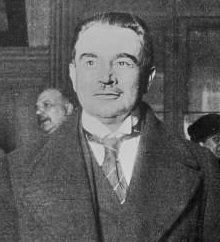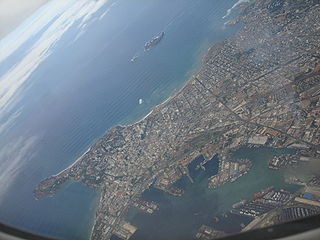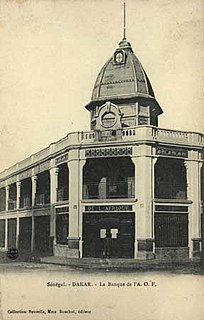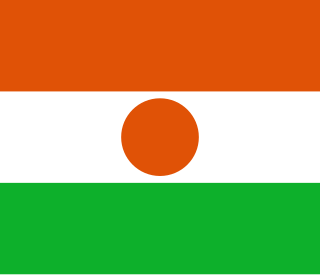
French Sudan was established in the late nineteenth century and occupied roughly the same territory as modern Mali.

The Dakar–Niger Railway connects Dakar, Senegal to Koulikoro, Mali. The name refers to the Niger River, not the Republic of Niger. It serves many cities in Senegal, including Thiès, and in Mali, including Kayes, Kita, Kati, Bamako. The line covers a course of 1,287 km of which 641 km lies in Mali. The line is managed by the Transrail consortium.

The West African CFA franc is the currency of eight independent states in West Africa: Benin, Burkina Faso, Guinea-Bissau, Ivory Coast, Mali, Niger, Senegal and Togo. These eight countries had a combined population of 105.7 million people in 2014, and a combined GDP of US$128.6 billion.

The Central Bank of West African States is a central bank serving the eight west African countries which share the common West African CFA franc currency and comprise the West African Economic and Monetary Union (UEMOA):
The French West African Cup or Coupe d'Afrique Occidentale Française was a football (soccer) tournament between clubs of the former French Western African territories.

Lutte Traditionnelle is a style of West African folk wrestling, known as Laamb in Senegal, Boreh in The Gambia, Evala in Togo, and KoKowa / Kokawa in Hausa areas of Nigeria and Niger, or simply Lutte Traditionnelle, in Niger and Burkina Faso. International competition takes place during the Jeux de la Francophonie and the newly organised Championship of African Lutte Traditionnelle.
Trade unionism is a powerful force in the politics, economy, and culture of Senegal, and was one of the earliest trades union movements to form in Francophone West Africa.

Water supply and sanitation in Senegal is characterized by a relatively high level of access compared to the average of Sub-Saharan Africa. One of the interesting features is a public-private partnership (PPP) that has been operating in Senegal since 1996, with Senegalaise des Eaux (SDE), a subsidiary of Saur International, as the private partner. It does not own the water system but manages it on a 10-year lease contract with the Senegalese government. Between 1996 and 2014, water sales doubled to 131 million cubic meters per year and the number of household connections increased by 165% to more than 638,000. According to the World Bank, "the Senegal case is regarded as a model of public-private partnership in sub-Saharan Africa". Another interesting feature is the existence of a national sanitation company in charge of sewerage, wastewater treatment and stormwater drainage, which has been modeled on the example of the national sanitation company of Tunisia and is unique in Sub-Saharan Africa.

Assane Seck was a Senegalese politician from Fogny. He served as Foreign Minister of Senegal from 1973–1978. He was said to be "forced into political retirement".
Abdoul Mbaye is a Senegalese banker and politician who was Prime Minister of Senegal from April 2012 until September 2013. He is a technocrat who was appointed prime minister by President Macky Sall following the latter's win in the 2012 presidential election.

Marie François Joseph Clozel was a French colonial administrator who became Governor General of French West Africa. Interested in understanding the region, he took an active part in developing French scientific research in West Africa in collaboration with the anthropologist Maurice Delafosse.

Jules Gaston Henri Carde was a French colonial administrator who served as Governor General of French West Africa and then Governor General of Algeria.

Orange Money is the mobile money service of Orange S.A., available in most of the group's affiliates in Africa. Its users can deposit money into an account linked to their mobile phone number, and then access a range of services, in particular transferring money domestically and internationally, paying bills and buying airtime top-up. Since June 2016, the service is available in France, where it enables international money transfer to Côte d'Ivoire, Sénégal and Mali.

The Autonomous Port of Dakar is a Senegalese public enterprise which is headquartered in Dakar, located in the east of city. Thanks to the strategic position that gives it a sheltered harbor, it is now the third largest port in West Africa after the Autonomous Port of Abidjan and the Port of Lagos It is also the ninth-largest port on the African continent.
International Africa Development Forum or is an annual event launched by Attijariwafa Bank, under the patronage of King Mohammed VI. The Fiad was put in place in 2010 by businessmen Mounir Majidi to raise a deep reflection around the development of the African continent.















